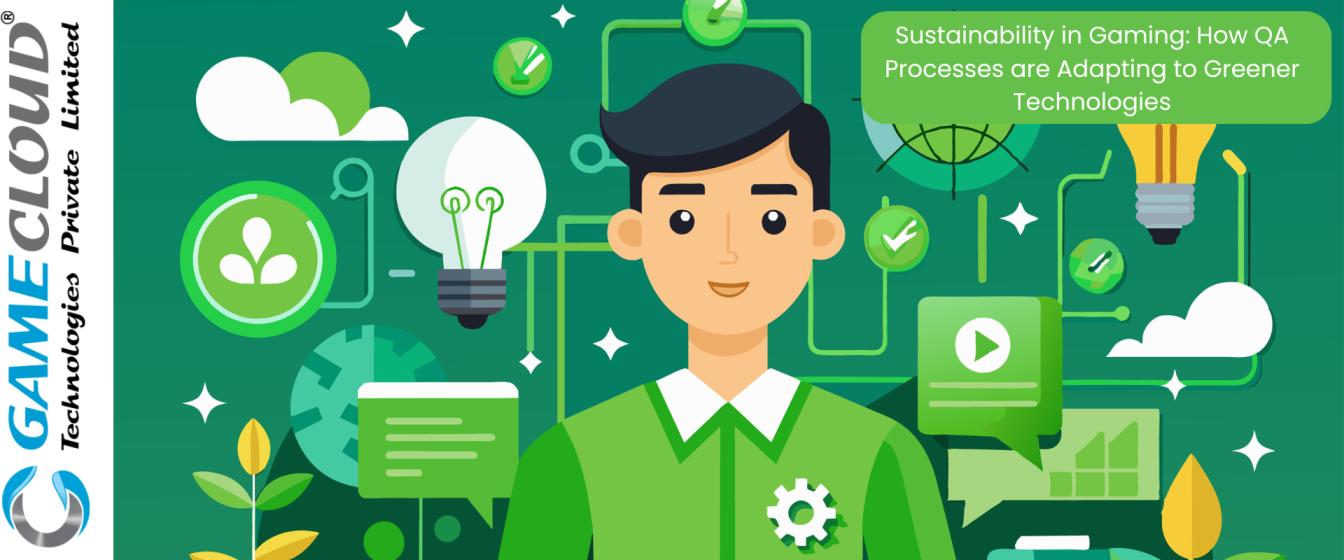
The gaming industry is booming, with over 3 billion gamers globally, but this growth comes with significant environmental challenges. Gaming consoles and PCs consume large amounts of energy, with some next-gen consoles using up to 200 watts of power. The U.S. gaming industry alone consumes around 34 terawatt-hours annually, equivalent to the energy used by 5 million cars. In response to these concerns, major companies like Microsoft and Sony have committed to reducing their carbon footprints, with Microsoft aiming to be carbon-negative by 2030 and Sony striving for a zero environmental footprint by 2050. As sustainability becomes more critical across industries, the gaming sector is adapting, with greener technologies and practices being incorporated to lessen its environmental impact.
QA processes in game development also play a crucial role, as they influence the energy efficiency of gaming software and hardware. By adopting greener QA methods, the industry is beginning to mitigate its ecological footprint.
Eco-Friendly QA Testing Tools and Approaches
In the pursuit of sustainability, QA teams in the gaming industry are adopting eco-friendly practices, including energy-efficient testing tools and processes. By utilizing cloud-based testing infrastructures, teams can optimize resource usage and reduce their environmental footprint. Cloud platforms allow for on-demand scaling and efficient sharing of resources, minimizing the energy consumption required to maintain local infrastructure. This shift also reduces hardware waste, contributing to more sustainable QA practices.
Sustainable test automation is another critical approach. Automating QA processes reduces the need for manual, resource-heavy testing, thus cutting down on energy consumption. Automated tests can run 24/7, covering more test cases with less energy, leading to faster and more efficient testing cycles.
Additionally, QA teams are increasingly adopting “green metrics” to measure and monitor energy use during testing. These metrics help quantify the environmental impact of testing activities, enabling teams to optimize processes for sustainability while maintaining quality.
Integrating Greener Technologies in Game Development
QA teams are increasingly promoting the adoption of sustainable coding practices to reduce the environmental impact of game development. By focusing on writing efficient, optimized code, developers can minimize server loads and energy consumption. Practices like reducing unnecessary data transfers, compressing files, and leveraging energy-efficient algorithms contribute to a leaner coding process that reduces overall resource usage. For instance, cloud platforms such as Google Cloud offer carbon footprint dashboards, helping developers monitor and reduce emissions from their applications.
In terms of hardware testing, game developers are transitioning towards greener technologies. This involves testing consoles and gaming peripherals that incorporate energy-efficient components and materials focused on recyclability. Some Companies are spearheading efforts to make consoles more energy-efficient and reduce their environmental footprint.
Furthermore, QA teams collaborate with developers to optimize game performance, reducing the load on data centers. With gaming increasingly shifting to cloud-based services, energy-efficient data management becomes crucial. Techniques such as optimizing server usage and utilizing green cloud services help in minimizing energy consumption and carbon emissions during game development.
GameCloud: Elevating Your Game from Concept to Global Success
At GameCloud, we go beyond traditional video game testing by ensuring your monetization strategies are safeguarded and your games run smoothly, offering an enjoyable experience for players at every stage. Our services support developers from the initial concept to post-launch, leveraging years of industry experience. With a global network of gamers and QA professionals, we gather invaluable real-world feedback to complement internal lab testing, helping studios of all sizes understand end-user preferences and ensure success in the ever-evolving gaming industry.
Conclusion
In the future, sustainable QA processes in gaming will likely focus on further reducing energy consumption and environmental impact through advanced automation, cloud-based testing, and optimized coding practices. With ongoing innovations, QA teams will play a crucial role in driving the industry’s commitment to eco-friendly development, ensuring a greener gaming ecosystem.
For Know More Contact-Now
FAQs for: Sustainability in Gaming: How QA Processes are Adapting to Greener Technologies
Why is sustainability important in the gaming industry?
The gaming industry, with over 3 billion gamers globally, consumes a significant amount of energy. For example, next-gen gaming consoles can use up to 200 watts of power, and the U.S. gaming sector alone consumes 34 terawatt-hours annually. These figures highlight the industry’s environmental impact, prompting a shift towards greener technologies and sustainable practices to reduce carbon footprints and energy consumption.
How are QA processes contributing to sustainability in gaming?
QA processes are adopting eco-friendly practices such as using energy-efficient testing tools, cloud-based infrastructures, and automation to reduce energy consumption and waste. By optimizing resource usage and monitoring energy metrics, QA teams help minimize the environmental impact of game development while maintaining high-quality standards.
What are “green metrics,” and how are they used in QA?
Green metrics are tools used to measure and monitor energy consumption during QA processes. These metrics enable QA teams to evaluate the environmental impact of testing activities and adjust their methods to achieve more sustainable outcomes, such as optimizing energy use and minimizing carbon emissions.
What role does cloud-based testing play in sustainable QA?
Cloud-based testing allows QA teams to use on-demand resources, reducing the need for maintaining local infrastructures. This approach minimizes energy consumption and hardware waste by enabling shared, scalable resources. Additionally, green cloud services further enhance sustainability by optimizing server efficiency and reducing carbon emissions.
How does GameCloud support sustainable QA practices?
GameCloud integrates eco-friendly QA solutions, including energy-efficient tools and processes, sustainable coding practices, and cloud-based infrastructures. By combining internal lab testing with real-world feedback, GameCloud helps developers optimize their games for performance and sustainability, contributing to a greener gaming ecosystem while ensuring global success for their products.
